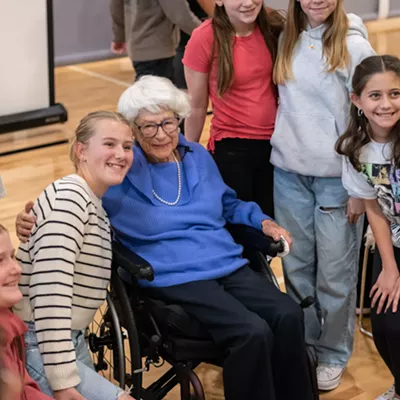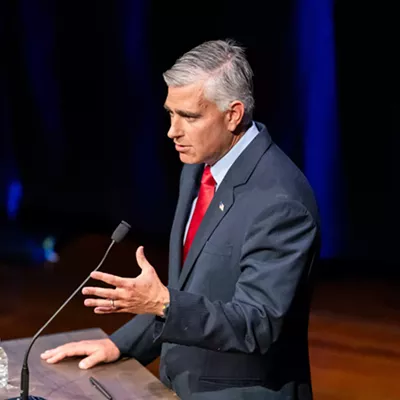
When alumni came to visit Whitman College last fall, sophomore Gus Coats stood proud and elegant in a pink dress and lace. A billowing gray wig sat upon his head, his eyelashes were long and thick, his cheeks were rosy, and a black mole jutted out from his upper lip.
He'd assumed the role of Marie Antoinette, walking from alumni luncheon to alumni luncheon, passing out slices of cake to bigwigs and donors. Think not of that New York Times story, he shouted through an anachronistic megaphone. Pay no attention to the peasants. Let nothing distract Whitman from "preparing our students for their aristocratic destiny."
That September, the Whitman student body came together to protest the composition of the Whitman student body. Hundreds of freshmen walked out of their core "Encounters" classes early. Senior Tyler Schuh went the guerilla art route, mocking Whitman's "Through adversities I rise" motto by placing rows of white milk jugs — labeled "Crème de la Crème de la Crème" — on the steps of the administration building.
That month, the New York Times ranked 100 of the most elite colleges by economic diversity. The "College Access Index" looked at the share of low-income freshmen attending the school, and the net cost to low- and middle-income families. By that ranking, Whitman was the very worst.
Other dishonors followed. A story on the New York-based website The Awl hammered Whitman for being "strangled" by insular and ineffective administrators and accused it of abandoning "any reasonable commitment to diversity."
This month, the Hechinger Report, a news site covering inequality in education, listed Whitman as one of six contenders to replace Washington University in St. Louis as the school with the lowest rate of students receiving federal Pell Grants. At only 10 percent, Whitman's share of students receiving Pell Grants was about half the rate of Whitworth or Gonzaga.
The line between elite college and elitist college can be a hazy one. It's not that Whitman students, as a whole, are especially rich. It's that almost none of them are poor.
With fewer than 1,600 students, Whitman is the size of a typical Spokane high school, but far more luxurious. Carefully tended ivy stretches up the walls of Maxey Hall. Cherry blossoms bloom alongside the rivers and ponds that run through the campus center. Even the athletic facility at the tiny Division III school boasts a sauna, a biomechanical analysis system, four racquetball courts, two squash courts and an entire full-scale indoor climbing center. The price of flashy facilities, of course, is nothing compared to the cost of paying Ph.D.s, instead of adjuncts, to teach small classes.
Competing for the best students quickly gets expensive, and Whitman's tuition reflects that.
Typically, only families making $60,000 or less are eligible for Pell Grants. In other words, without aid, Whitman's combined $59,000 price tag — tuition, room and board and fees — would nearly consume those families' incomes.
Whitman junior Shireen Nori ran last year's "Power and Privilege" symposium. Both her parents were Indian immigrants, and Nori considers herself middle class. Unlike East Coast colleges, Nori says, students at Whitman don't get flashy about their wealth. But the class divide can still stick out.
"I was maybe hyper-aware of the clothes that I had. The fact that I didn't have a car here," she says. "My parents not coming to visit over Parents Weekend, because they couldn't get off work."
Before arriving at Whitman, incoming freshmen are encouraged to attend an an outdoor adventure called a "scramble." But scrambles cost hundreds of additional dollars, and Nori didn't know about scholarships that could help defray the costs. So she never went.
It's why the school has a First Generation/Working-Class Students club, to fight the "silence and stigma" of coming from a different socioeconomic background. Not being rich can be isolating.
Many students see the ideological contradiction. This is a school where Che Guevara posters decorate professors' doors, where students reflexively qualify their opinions as coming from a place of privilege, where just last spring, Robert Reich gave a lecture on the "time bomb" of widening economic inequality, and tasked students with seizing a "leadership role in reversing these trends."
Which is exactly why students are bothered about the student body exemplifying that inequality. "They go to class and learn about progressive politics, and all of these liberal policies and all of these wonderful ideals," says Coats, the sophomore. "What does that tell you about what you're learning, that the college doesn't even believe the things they're telling you?"
Whitman, like most private colleges, has an ongoing debate: Does it spend its limited financial aid on awarding "merit" — luring the smartest students and increasing the college's prestige — or on awarding "need," making high-priced colleges affordable to low-income students?
In the early '90s, Whitman was focused on the latter. Every student who needed financial aid got it, and far more students were receiving Pell Grants. The school suffered because of it.
"With the quality of the student body declining, the discount rate rising, budgets cut and salaries frozen, a shift was necessary for economic and enrollment reasons," a 2004 report concluded. So in 1992, Whitman radically changed its strategy, "buying" prestige by handing merit scholarships to smart students, even those who didn't need aid. Today, a third of Whitman's financial aid recipients are merit scholarship winners who never even applied for financial aid.
The issue is not just that poor students can't afford Whitman. It's that some students apply to Whitman and are rejected because they're poor.
Most colleges in Washington have "need-blind" admissions policies — coming from a low-income family won't officially hurt your chances of being admitted. But in 2010, with its still-sizable endowment rocked by the recession, and more students than ever needing aid, Whitman changed course.

Most Whitman applicants are still either clearly rejected or accepted on their merits. For those on the bubble, Whitman closely examines the student's family's income and assets, weighing them against what the college can afford to provide. Every year, around 50 to 100 Whitman applicants don't make the cut, in part because their families don't make much money.
After all, if many students Whitman admits can't pay the price to attend, the college can't easily predict its enrollment numbers. A lower-than-expected enrollment can devastate a small college's budget.
"The ethical dilemma is, do we admit these [low-income] kids and not give them a great financial aid package?" says Tony Cabasco, Whitman's dean of admission and financial aid. "Or do we admit a smaller number, but give them all great financial aid packages?"
Among elite colleges, this policy isn't unusual — the University of Puget Sound does it too — but it remains controversial. When Wesleyan University put a similar policy in place in 2012, students angrily stormed a closed board of trustees meeting.
Cabasco says the New York Times list has flaws: With so few lower-income students at Whitman, a few outliers can skew the whole data set. The list doesn't consider international students, who make up 5 percent of Whitman's student body and are ineligible for Pell Grants. Unlike many schools, Whitman gives them financial aid. Whitman not only enrolls "undocumented" students, it gives two of them scholarships. "One of them is here visiting today," Cabasco says. The school has an emergency fund to help individual students with unexpected costs — like medical bills or tickets to attend funerals.
Half of Whitman's students walk away without any debt, and of the students who have debt, it's low.
"Of the 1,500 kids we admit, we do a pretty good job with those families," Cabasco says. "Our students said, 'Do a good job of taking care of the students you have, first.'"
College protest movements burn bright, hot and brief. By October, the outcry over socioeconomic diversity had quieted. But the national attention and student complaints have had an impact.
"We have a responsibility to increase access wherever we can," outgoing Whitman President George Bridges told the Hechinger Report. Even before the New York Times rankings came out, Whitman was exploring whether it needed to increase its aid to low-income students.
The college's latest fundraising campaign intends to raise $50 million in scholarships, many for first-generation students. In the fall, Whitman's first-year students will get more financial assistance than before, and low-income upperclassmen will receive larger stipends for research and internship opportunities.
After all, Cabasco says, some of Whitman's low-income local students have turned into its most famous alumni. Like the Yakima kid who earned pennies as a child sweeping stores and washing windows so his family could afford to eat, who was able to attend Whitman thanks to a partial scholarship. That kid, William Douglas, went on to become the longest-serving Supreme Court justice in U.S. history.
"Whitman has had a tradition over the years of discovering diamonds in the rough, who may come from modest backgrounds," Cabasco says, "and providing them with this great education." ♦






















